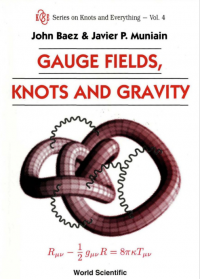Add a new page:

There are almost surely hundreds of precise textbooks on differential geometry and fiber bundles, many bringing to mind the observation by C.N. Yang that “There are only two kinds of math books. Those you cannot read beyond the first sentence, and those you cannot read beyond the first page.” On the other end of the spectrum are the “[x] for physicists” books which often treat their chosen material intuitively but not precisely enough to be useful in calculating or deriving anything. The chief strength of this book is its ability to do both well, and in a non-cumbersome formalism. Concepts are explained in a clear, easy to read manner and then connected to precise definitions written in a useful formalism. Any one of these three can make for a useful book, but Baez and Muniain set a new standard by offering all three. And over 300 exercises.Joseph M. Renes
Part I:
A:
A: Suppose we have a path from the identity to $g\in G_0$. Now map this path to a new path by multiplying each element by $h\in G_0$. This path starts at $h$ and since the mapping is continuous, must remain in $G_0$. (Otherwise, smoothly mapping the group manifold to $\mathbb R^n$ would show a discontinuity at some point.) Thus $hg\in G_0$ for all $h,g\in G_0$. There's a certain tension between having a smooth manifold with disconnected pieces — given a map from the the manifold to itself, one must take care that it does not have a discontinuous action, mapping some points in one component to another component. When this map is an element of the group, this requirement makes $G_0$ into a subgroup.
Part II:
A: Suppose we have a path from the identity to $g\in G_0$. Now map this path to a new path by multiplying each element by $h\in G_0$. This path starts at $h$ and since the mapping is continuous, must remain in $G_0$. (Otherwise, smoothly mapping the group manifold to $\R^n$ would show a discontinuity at some point.) Thus $hg\in G_0$ for all $h,g\in G_0$.
There's a certain tension between having a smooth manifold with disconnected pieces — given a map from the the manifold to itself, one must take care that it does not have a discontinuous action, mapping some points in one component to another component. When this map is an element of the group, this requirement makes $G_0$ into a subgroup.
Source: Solutions to Exercises in Gauge Fields, Knots and Gravity by Joseph M. Renes licensed under a Creative Commons Attribution 4.0 Licence.
See also: